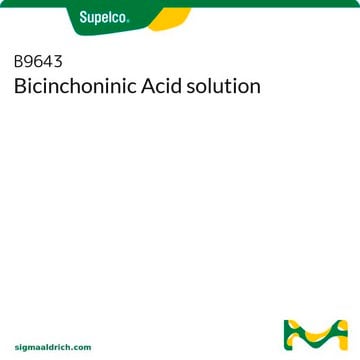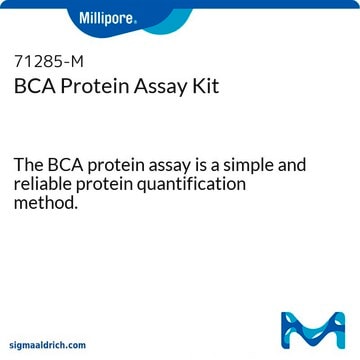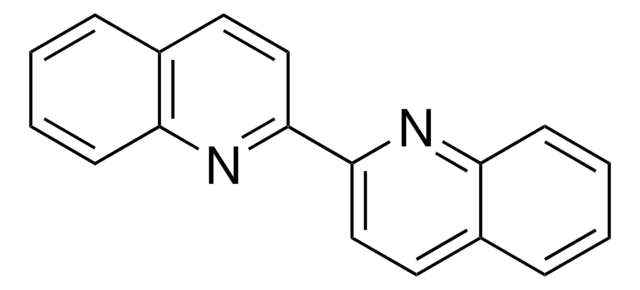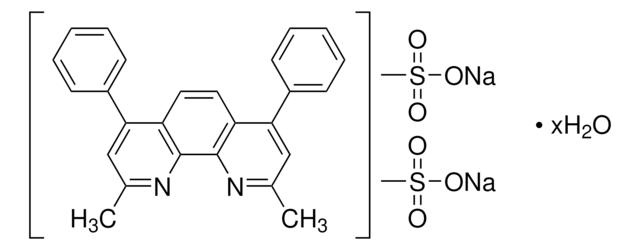D8284
Bicinchoninic acid disodium salt hydrate
≥98% purity (HPLC), powder
Synonyme(s) :
2,2′-Biquinoline-4,4′-dicarboxylic acid disodium salt, 4,4′-Dicarboxy-2,2′-biquinoline disodium salt, BCA, Disodium 2,2′-biquinoline-4,4′-dicarboxylate
About This Item
Produits recommandés
product name
Bicinchoninic acid disodium salt hydrate, ≥98% (HPLC)
Niveau de qualité
Pureté
≥98% (HPLC)
Forme
powder
Technique(s)
titration: suitable
Couleur
white to light yellow
Solubilité
0.5% sodium bicarbonate: 50 mg/mL
Application(s)
diagnostic assay manufacturing
hematology
histology
Température de stockage
2-8°C
Chaîne SMILES
O.[Na+].[Na+].[O-]C(=O)c1cc(nc2ccccc12)-c3cc(C([O-])=O)c4ccccc4n3
InChI
1S/C20H12N2O4.2Na.H2O/c23-19(24)13-9-17(21-15-7-3-1-5-11(13)15)18-10-14(20(25)26)12-6-2-4-8-16(12)22-18;;;/h1-10H,(H,23,24)(H,25,26);;;1H2/q;2*+1;/p-2
Clé InChI
FAFVGCAYKZKOPT-UHFFFAOYSA-L
Vous recherchez des produits similaires ? Visite Guide de comparaison des produits
Application
- Bicinchoninic acid disodium salt hydrate has been used to monitor the levels of reducing sugars, thereby helping in the detection of chitinases.
- It has also been used to determine the amount of cellulose reducing ends (micromoles/g cellulose).
- It has been used for determining protein concentration.
Actions biochimiques/physiologiques
Produit(s) apparenté(s)
Mention d'avertissement
Warning
Mentions de danger
Conseils de prudence
Classification des risques
Eye Irrit. 2 - Skin Irrit. 2
Code de la classe de stockage
11 - Combustible Solids
Classe de danger pour l'eau (WGK)
WGK 3
Point d'éclair (°F)
Not applicable
Point d'éclair (°C)
Not applicable
Équipement de protection individuelle
dust mask type N95 (US), Eyeshields, Faceshields, Gloves
Faites votre choix parmi les versions les plus récentes :
Certificats d'analyse (COA)
Vous ne trouvez pas la bonne version ?
Si vous avez besoin d'une version particulière, vous pouvez rechercher un certificat spécifique par le numéro de lot.
Déjà en possession de ce produit ?
Retrouvez la documentation relative aux produits que vous avez récemment achetés dans la Bibliothèque de documents.
Les clients ont également consulté
Notre équipe de scientifiques dispose d'une expérience dans tous les secteurs de la recherche, notamment en sciences de la vie, science des matériaux, synthèse chimique, chromatographie, analyse et dans de nombreux autres domaines..
Contacter notre Service technique











